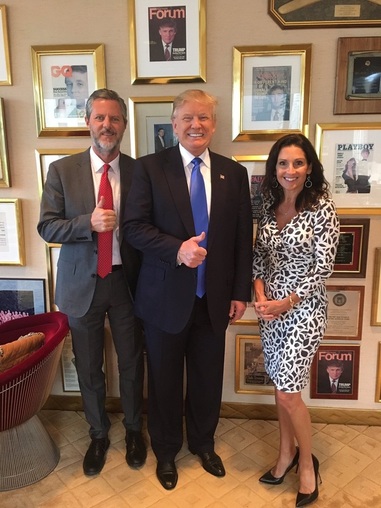 (Photo: DonkeyHotey) (Photo: DonkeyHotey) Welcome to our first ever FTSOA chat! What follows is a free-flowing discussion between Russell, David, and Mike Lehmann, a Republican political operative with a Duke Divinity School degree and friend of the program. This conversation has been slightly edited for clarity. DAVID: I hear lots of people talking about the choice between Trump and Clinton as picking between “the lesser of two evils” and many seem conflicted about doing that. But what is the moral significance of voting for an objectionable presidential candidate? Are you morally on the hook for the candidate’s full slate of positions? Should your conscience hold you back? RUSSELL: Great questions, David. As far as voting goes, I think one thing to ask right off the bat is, “What does it mean to vote for president?” On the one hand, we as a nation are selecting a person to do a job. On the other hand, we are casting a vision for what our nation is, what values we hold. We want someone who will do the job of president (so we should vote for the best possible candidate because SOMEBODY has to do the job), but we also want to choose a platform we can get behind, an agenda for our nation’s next four years we support (so we shouldn’t vote if none of the options before us is morally worthwhile).  Arnold Schwarzenegger’s reaction when he found out it’s Hillary v. Trump. OK, not really . . . but probably. (Photo: Jim Greenhill) Arnold Schwarzenegger’s reaction when he found out it’s Hillary v. Trump. OK, not really . . . but probably. (Photo: Jim Greenhill) MIKE LEHMANN: I’m of the persuasion that life’s tough, there aren’t enough Arnold movies, and there are only two choices for president. I understand the argument that if you can’t fully get behind a candidate, then you shouldn’t vote — I just disagree with it. And I’m fascinated by the role partisan identity plays in this discussion. For years, such reputable sources as South Park have noted the two major party candidates usually leave much to be desired. This year, with historically unpopular nominees, is worse than ever. Watching people put their party before their country is interesting, and infuriating. DB: I don’t think I ever would have been able to vote for president if it required getting behind the candidate “fully”; I’ve always had a serious moral objection to at least one plank in every platform. Is part of the problem this year that for a long time people have made it too easy on themselves to get fully behind candidates in the past? Have they been too quick to support everything one candidate or party recommends? More pointedly: have too many Christians thought that one of the candidates or one party represented “the Christian option”, whom they could support without compromise? They don’t see that option this year, are frustrated, and aren’t sure what it means to vote for someone they can’t support without reservation? RJ: FTSOA chats have been around for about five minutes, so we’re overdue for a reference to Hitler. I think some people want to keep the “don’t vote” option as a live option by saying, “If the only options are Hitler and Stalin, the ethical thing to do is vote for neither.” Now, the USA hasn’t nominated anyone as evil nor as stylish as Hitler, so this is obviously not a comparison for the present election. But the point is that a vote conveys support for an agenda, and some agendas (even if not either of the ones currently on offer) are in principle undeserving of support. I take the point, and I feel like the option to not vote is one that should be kept theoretically open even if not resorted to ever (just like the possibility that I might eat a cat, since in a survival scenario it is theoretically possible). DB: Does a vote “convey” anything? Or is it a strategic choice done in secret? RJ: I think so. If the USA elects a candidate, we are choosing her or him to speak on our behalf, to represent us. That might, however, be about “votes” rather than “a vote,” which could be a relevant distinction. ML: To clarify, I’m all for keeping the “don’t vote” option open, and there are other ways dissatisfied folks this year (looking at you, Bernie Bros) can achieve real political results — such as voting down ballot. The bottom line, though, is that there are only two realistic outcomes in January: an old, corrupt, and godless liberal is sworn in as president . . . or Hillary Clinton wins. DB: I want to go back to this idea that I’m conveying something with my vote. It seems to me that this cannot mean that I’m endorsing the recipient of my vote. Say I’m a Republican and I think both candidates will make a horrible president; a horrible president is assured either way. Don’t I want the Democrats to have that egg on their face, not the GOP? Shouldn’t I vote so that this awful national spokesperson doesn’t bear my party’s name? In that case I’m not conveying support for the candidate with my vote, I’m thinking about preserving conservatism for the long term. In that case, would I be morally complicit for the terrible things that terrible president does, if I’m making a reasonable judgment about the long-term good of the country, if I have a defensible reason to think what I’m doing is best?  L. Ron Hubbard, the founder of Scientology. (Photo: Bill Alldredge) L. Ron Hubbard, the founder of Scientology. (Photo: Bill Alldredge) ML: Ah, David, that was my exact line of thinking this year! Unfortunately, the overwhelming majority of Republican elected officials disagree with it. You would think that the smart, long-term play would be to renounce Trump in order to preserve the party’s future viability. And, when presented with the choice of Trump or Ted Cruz, I think it would have made much more sense to choose Cruz. It’d be infinitely better for the GOP to nominate a Barry Goldwater, get wiped out, and live to fight another day — instead of nominating the political equivalent of L. Ron Hubbard. DB: Do you think Cruz would have lost by more than it looks like Trump will? ML: Unclear. Cruz ran the best campaign in the Republican field, and it wasn’t even close. I think Cruz would make it closer, simply because Trump is neglecting the basic blocking and tackling of campaigning: fundraising, field offices, and ad buys. DB: OK, this is really interesting and I want to keep going . . . but I wonder if we should tack back toward our focus on religion. I realize I could go all night talking to Mike about this stuff. RJ: Sure, David. Here’s a thought: I think for many people, “what’s best for my party,” “what’s best for America,” and “what is morally the right thing to do (in light of my faith commitments)” have more or less overlapped. That is, people in both parties have felt little internal dissonance (there’s always some, to be sure) in selecting a candidate because all of their major affiliations (party, country, church) have led to the same conclusion. This year is different for a lot of people; it’s like trying to solve a math problem three different ways and getting three different answers. ML: That’s a great point, Russell. Usually those three overlap, but this year has exposed a stunning fissure between them. Case in point: Remember when Republicans scolded Bill Clinton in the ’90s, and kept saying that character matters? Well, now they’ve nominated a thrice-married vulgarian who brags about his exploits in public! How do you square that circle if you’re a Christian voter? Sadly, many in the religious right have chosen party and power over theological principles. RJ: That picture of Trump with Jerry Falwell Jr. on his right and a copy of Playboy, with Trump on the cover, to his left was particularly illustrative. Is this reflective of an ongoing development/problem (remember that Mitt Romney wasn’t exactly the picture of the evangelical Moral Majority in pristine purity), or is it something new? Should Republicans facing the “lesser of two evils” dilemma now be realizing that they’ve already been picking the lesser of two evils for years now? ML: I think the temptation here has always been proximity to power, and I think it goes back decades. Billy Graham really helped Nixon with religious voters/disenchanted Democrats in 1972, but in the process Graham let the allure of the Oval Office muddy his principles and leave him susceptible to one of the only moral crises of his august career. And then in 1980, why did Jerry Falwell endorse a twice-married Hollywood actor over Jimmy Carter, a self-described “born again” Christian”? As an evangelical myself, this is an uncomfortable truth, but proximity to power often corrupts the purest motives — and has been the priority far too often. RJ: The quest for political power threatening to corrupt Christian convictions? This warms my little Mennonite heart. Is what is at stake here (I’m channeling Stanley Hauerwas, so watch out for curse words) a clash between “Christian values” and Christianity? Have the former broken off and taken on a life of their own, largely disconnected from the latter? I heard evangelical conservatives say of Romney, “Sure, he’s LDS, but he holds strong Christian values.” Wayne Grudem basically said of Donald Trump, “Sure, he’s . . . whatever he is, but his platform and campaign promises are commensurate with Christian values.” What is a “Christian value” if not the sort of thing that occasionally calls into question affiliation with a political party or movement? DB: If an ideology can tell you clearly which party to vote for (as some people claim “Christian values” can), can it be Christianity, in principle? Put another way, it seems to me that translating Christianity into a political platform is really hard; s it impossible? Is religion the realm of the pure, while politics is a necessarily messy process in which Christianity is irrelevant? (I’m not claiming it is.) Should we recommend the following rule: if what you think of as “Christianity” always aligns neatly with a U.S. political party, then that thing is necessarily not Christianity? ML: Russell, I think you’re absolutely right that “Christian values” have broken away from Christianity and taken on a bizarre life of their own. I also think that reason is the slave of our passions, so you get lots of people jumping to political conclusions, and only then ransacking their brains to come up with articulate justifications. (That’s how Jerry Falwell and William J. Barber II read the same Bible but come up with such different conclusions.) And David, I think it’s impossible for Christianity — whatever that even means — to fall neatly into one political party. Honestly, I think Christianity is fundamentally opposed to a neoconservative foreign policy, but Christianity is also opposed to abortion on demand. RJ: David, I’m reminded of a quote from MLK: “It may be true that the law cannot make a man love me, but it can keep him from lynching me, and I think that’s pretty important.” I don’t think Christianity is the sort of thing that can easily translate into a political party. But there are policies that are more amenable to it than others, and there are policies that are more at odds with it than others. Christianity demands enemy-love, which no Senate can legislate. But if one senator is advocating carpet bombing and another isn’t, then one of them is closer to the Christian message of enemy-love. So Christianity cannot exhaustively be translated into a political agenda (in principle, not just “it’s neither Republican nor Democrat”), but it’s certainly not irrelevant to political decision-making. Maybe I’ll put it this way: with regard to Christianity and politics, there’s a lot of “more” and “less,” some “absolutely no,” but rarely if ever an “absolutely yes.” There will never be a “the Christian option,” because the only person who could be that candidate would be Jesus (and remember, they tried to make him king and he refused), but there are Christian reasons for preferring one candidate over another. Let’s bring this to a sort of conclusion; I’ll ask both of you one final question. What response would you have to someone who said, “Clinton and Trump? I can’t vote for either of them because I disagree with both of them.” Is there a succinct response to that way of thinking, or at least something people should keep in mind before committing themselves to that decision? ML: I would begin by affirming their frustration, but reiterating that one of these two candidates is going to be president. It’s a terrible choice, but it’s one we all have to make: you have to decide who you think will be a better one-term president . . . because the jockeying for 2020 has already started. DB: First, I’d say I’m jealous that you are only facing this now. I have disagreed (in profound ways) with every candidate I’ve ever voted for. Second, I’d ask why you think voting for a president involves the moral equivalent of signing a contract endorsing his/her entire platform. As far as I know, that’s not in the rules. Votes are strategic political choices, not binding moral endorsements. Mike is absolutely right that one of those two folks will be our next president. You have a responsibility to be realistic and make a choice about which of the two you want to be president least, and you need not hesitate to vote for the other. RJ: Well, those are good concluding thoughts. Thank you both, this has been a good conversation. You’d both make great write-in candidates. . . JOIN THE CONVERSATION IN THE COMMENTS
1 Comment
|
Archives
September 2020
Categories
All
|


 RSS Feed
RSS Feed